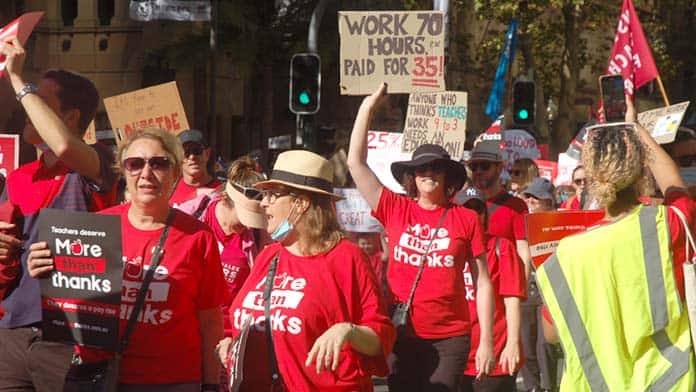Wage rises and the cost of living were a major issue in the federal election campaign, with inflation now running at 5.1 per cent and set to increase further.
Essential workers including NSW teachers and nurses, aged care workers, and bus drivers in Sydney and Melbourne all took strike action in the lead up to the election as a result of being overworked, understaffed and underpaid.
On 4 May teachers across NSW took strike action for the second time in five months, with more than 15,000 marching on NSW parliament house. A teacher shortage, made even worse this year due to COVID absences, and workload issues have generated deep anger.
Teachers are working 60-hour weeks on average, with more time spent on administrative tasks and paperwork than preparing lessons. On top of high workloads, teachers’ pay has also fallen below inflation rates.
With inflation now over 5 per cent, the NSW government pay rise cap for public sector workers is still just 2.5 per cent a year. Premier Dominic Perrottet has signalled a change to this in the state budget in June. But he is not saying by how much.
Almost 10,000 aged care workers from 120 sites took strike action in Queensland and WA on 10 May, demanding better pay and staffing. COVID-19 has been pushed an already understaffed and underfunded system to the brink.
United Workers Union aged care director Carolyn Smith said workers have been forced to do double and triple shifts, without suitable PPE, and “no let-up in sight in many facilities”. There are simply far too few staff to meet the needs of those in aged care.
Workers at Moreland Council in Melbourne protested outside Brunswick Town Hall for a pay rise on 4 May as part of industrial action taken by librarians, cleaners, garbage collectors, childcare workers, community support workers and home-care workers.
After going without a wage rise in over two years, members of Australian Services Union have now agreed to a 2.6 per cent increase backdated to July 2021, and another 2.1 per cent from July this year. Management initially offered a 1 per cent increase.
Also in Melbourne, 1500 bus drivers went on strike for 24 hours on 5 May across 100 bus routes and 100 school bus services. Bus drivers have insufficient wages and irregular hours.
Paul Addamo, a bus driver for 30 years, stated that on some days he would work a five-hour shift while on others he would work up to 14 hours. The bus services are contracted out by the state government to private companies, Dyson and Ventura.
About 2000 bus drivers staged a 24-hour strike in Sydney in April, with drivers in Region Six across the Inner West holding fare-free days every Friday in May. Opal card machines have been turned off as a part of industrial action taken as part of enterprise bargaining negotiations.
All of Sydney’s bus services are now run by private operators after a state government privatisation drive. Workers are doing the same work on different wages and conditions as a result of conditions locked in before privatisation not applying to new workers.
Labor governments
In NSW, public sector unions are hoping that voting out the state Liberal government next March can deliver better staffing and pay.
Nurses and midwives have staged two 24-hour strikes since February demanding mandated nurse-to-patient ratios of one nurse to four patients. Despite this, the Labor Party reversed its previous support for ratios in its response to a parliamentary inquiry on conditions in hospitals in rural and regional NSW.
A spokesperson said that Labor would undertake further costing and review the policy ahead of the state election. But the move is a warning that the unions cannot rely on Labor’s support.
Anthony Albanese’s election victory included the pledge that “Labor has a plan to boost wages”.
But apart from a submission for an as-yet unspecified increase to the minimum wage to the Fair Work Commission and an unspecified wage rise for aged care workers, it has no plan to deliver this.
With the cost of living set to rise further, it will require active union campaigning and industrial action to win the better pay and conditions workers deserve. The strikes in the lead up to the election show the way.
By Anja Burrill






